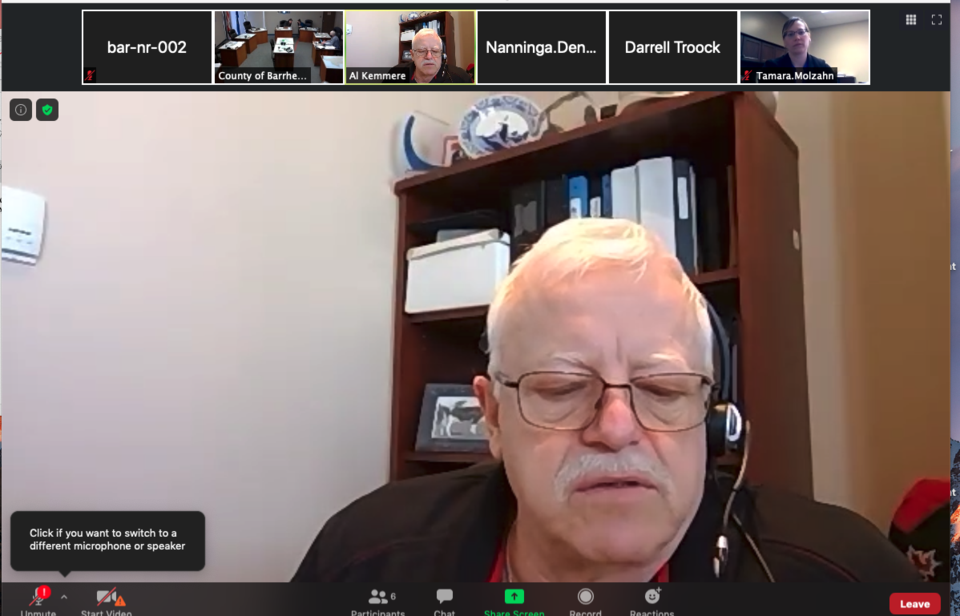BARRHEAD - It is better to be at the table than be on the menu.
That is what Al Kemmere told County of Barrhead councillors during their March 2 meeting.
Council invited Kemmere, who is the former president of the Rural Municipalities of Alberta (RMA) to ask if he believed rural governments in Western Canada should be part of the Federation of Canadian Municipalities (FCM).
FCM is an advocacy group representing more than 2,000 municipalities across Canada, including both in Barrhead. Although the group has no formal legal power, it lobbies the federal government on issues important to municipalities.
Kemmere, who appeared by video conference, said he believed that despite all of its faults, rural Western Canadian municipalities were better off being a member of FCM than not.
In January, the Municipal District of Bonnyville sent out a form letter suggesting to rural Alberta municipalities stating they might be better off not being a member of FCM.
"The past few years have presented convincing evidence of the continued lack of advocacy and blatant disregard at the federal level of Western Canada's needs and one of its highly significant industries that impacts us all: the natural resources. Our council ... is beyond frustrated with this lack of effective representation that Western municipalities receive," stated Bonnyville reeve Greg Sawchuck, adding that FCM is the only voice rural municipalities have at the federal table.
Reeve Doug Drozd said county councillors share Bonnyville's frustration and every year they struggle to decide whether they should renew their FCM membership.
"At the end of the day, for whatever reason, we always decide to renew," he said.
However, he said they are never sure that they have made the right decision as they don't have a strong idea of how much advocacy RMA does for rural communities, as they have never been involved in its inner workings.
Kemmere has been involved with FCM since 2007, starting at the committee level and eventually became part of its board of directors when he became president of the RMA.
During his time as part of the FCM, at the committee level, he participated in discussions at the committee level on issues such as rural crime, oceans and fisheries, navigating waters, transportation, broadband Internet, environment and oil and gas development.
"The one I would speak the strongest on over the years is the role of rural and small communities," Kemmere said. "Because if you are not careful, the big city mayors will control the agenda. There is a political reality that the government recognizes the mayor that represents 500,000 or a million more than the one who represents 5,000."
To overcome the natural advantage larger municipalities have at the FCM table, Kemmere believes rural municipalities need to have strong representation and the only way to get that is through strength in numbers.
Fortunately, he said FCM has a strong caucus of rural Alberta communities.
Kemmere recalled how two resolutions dealing with Alberta concerns went through marathon debate sessions of more than six hours each before moving forward.
"My opinion is that there is a tremendous value in our membership in FCM and having Alberta's voice heard at the table," he said. "Each time a rural member leaves, the strength of that voice is diminished." Kemmere said FCM realized that Western Canadian municipalities have unique challenges and that, they needed to give these municipalities a mechanism to have their voices heard, especially after the results of the last federal election where Western Canada is severely underrepresented in the government. They needed to give these municipalities a mechanism to have their voices heard.
The result, he said, was the creation of the Western Economic Solutions Taskforce (WEST).
"The advocacy FCM carried through WEST to the federal government the result was having monies come to Western Canada to deal with the orphaned well situation," Kemmere said. "We were actually able to sit nose-to-nose with the prime minister and say this is important to Western Canada."
Another issue WEST attempted to bring to the federal government was the cost of drying grain due to the carbon tax.
"We did not get what we wanted in that one, but having our voice heard is the important part because next time we might be successful," he said.


